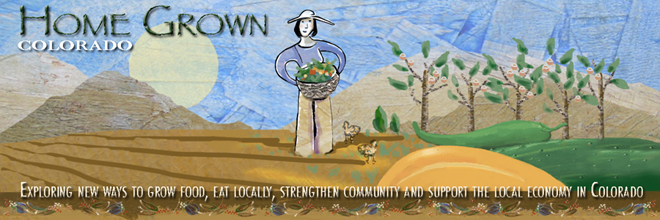Tuesday, March 10, 2009
7 pm to 9 pm
Mercury Cafe
2199 California Street
Denver Co
$5 donation suggested
Food brings us together. The lack of food destroy the fabric of families and communities. How do we grow healthy food and community that reflects our cultural and family roots? How do we create a community-led sustainable movement toward local food and local economy? Join a discussion on how to create healthy, affordable food for all in the Denver Community. Transition Denver is sponsoring this event and panelists include:
- Adrienna Corrales, Project Coordinator and Community Health Educator for Sisters of Color United for Education.
- Akwe Starnes, an educator at CSU's Extension Program and an elder in our community that shares various reasons to move toward a raw plant based diet, its affects on the earth, its value nutritionally and within this economic climate.
- Ashara Ekundayo, an award-winning producer, curator, media activist, social networking groupie, and the owner of BluBlak Media – a Denver, CO based independent production and consulting company.
- Faatma Mehrmanesh sits on the Board of Directors of the Mile High Business Alliance and plans to change the face of business by opening a community owned and operated cafe in Denver’s own Historic Five Points Neighborhood.
- Marilyn Meginity, proprietor of the colorful Mercury Café and passionate advocate for local foods and community.
- Shannon Francis is the Indigenous Agricultural Instructor/Coordinator at Woodbine Ecology Center located in Sedalia, Colorado.
Intro to Neighborhood Supported Agriculture - Kipp Nash, Community Roots
Monday, March 16, 2009
6 pm to 9 pm
$25.00 Fee
Denver Botanic Gardens, Classroom B
1005 York Street, Denver, CO
National Ag Week, March 15-20
Colorado Celebrates National Ag Week March 18
1:00 p.m. Press Conference on the west steps of the Capitol in Denver
This month, Americans will celebrate National Ag Day on March 20. National Ag Day is about recognizing the contribution of agriculture in our everyday lives and the important role our local ranchers and growers play in the lives of those in our communities and around the globe.
An Educational Evening with Slow Food Denver and the Mujeres de Maiz (Women of the Corn) Project
Monday March 23
5:30pm - 7:30pm
Home of Elayne Gallagher
2001 Lincoln Street (triangle at Welton, 20th and Broadway - 2 1/2 blocks walking from 16th Street Mall)
No charge (Slow Food members and non-members invited!)
Slow Food Denver is sponsoring an open house given by two of its members, Jan Webster and Elayne Gallager, to learn about an exciting project they are working on in Chiapas, Mexico. Elayne is a board member of Starfish, a Colorado organization working with indigenous women in Guatemala and Chiapas, Mexico. The project is called Mujeres de Maiz (Women of the Corn) and the goals are to raise the production and the consumption of native organic corn and to improve the standard of living, dignity and nutrition standards of these indigenous women, their families and communities. Please RSVP to rsvp@slowfooddenver.org by Wednesday March 18.
3rd Annual Rocky Mountain Compost School
April 14-17, 2009
CSU
Cost: $495
The school is hosted by Colorado State University's Department of Soil and Crop Sciences, and includes four days of classroom and field instruction for large-scale composters highlighting issues of local and national interest. Certified Crop Adviser continuing education units have been designated for participation in Compost School. For specific questions or more information, please contact: Adriane Elliott, (970) 491-6984, adriane.elliott@colostate.edu







